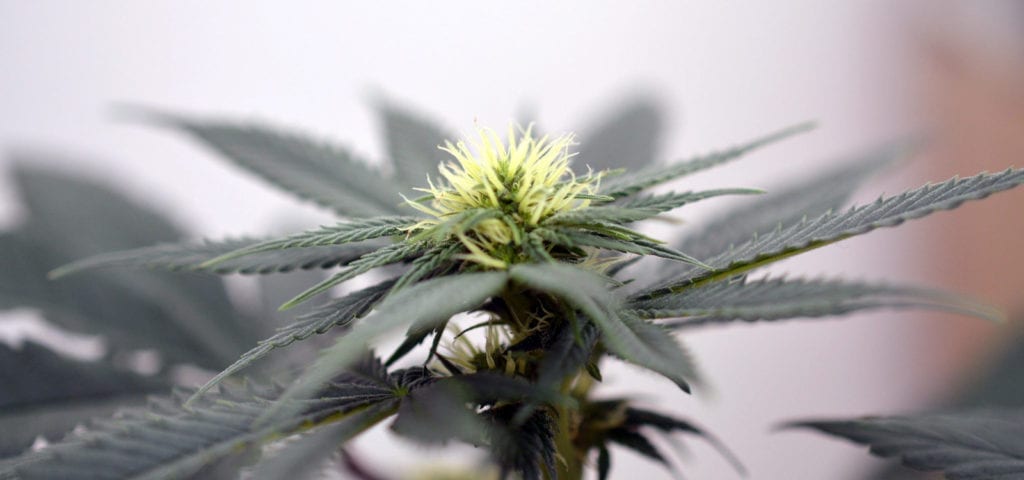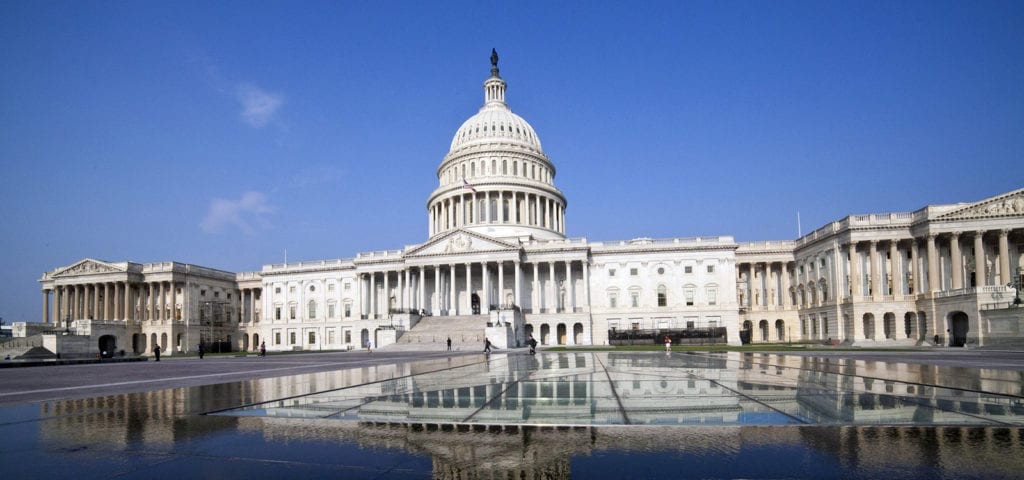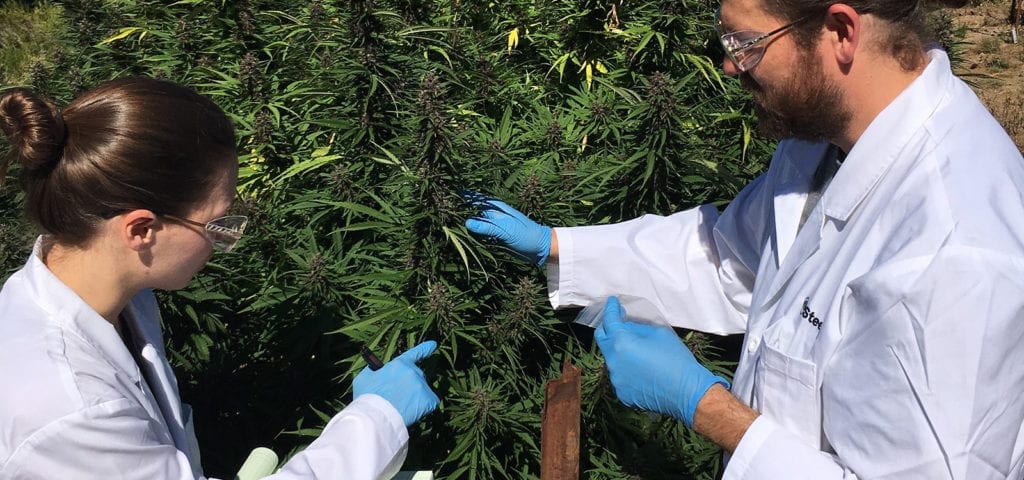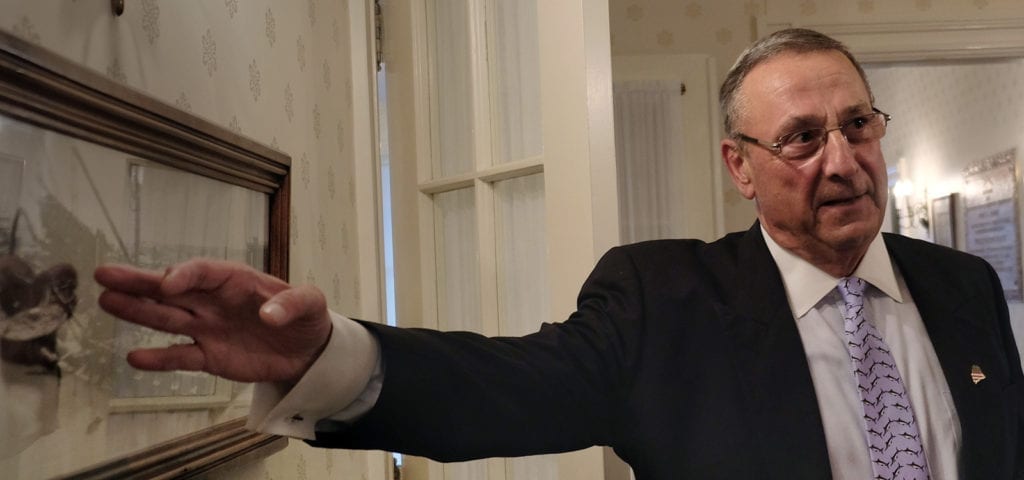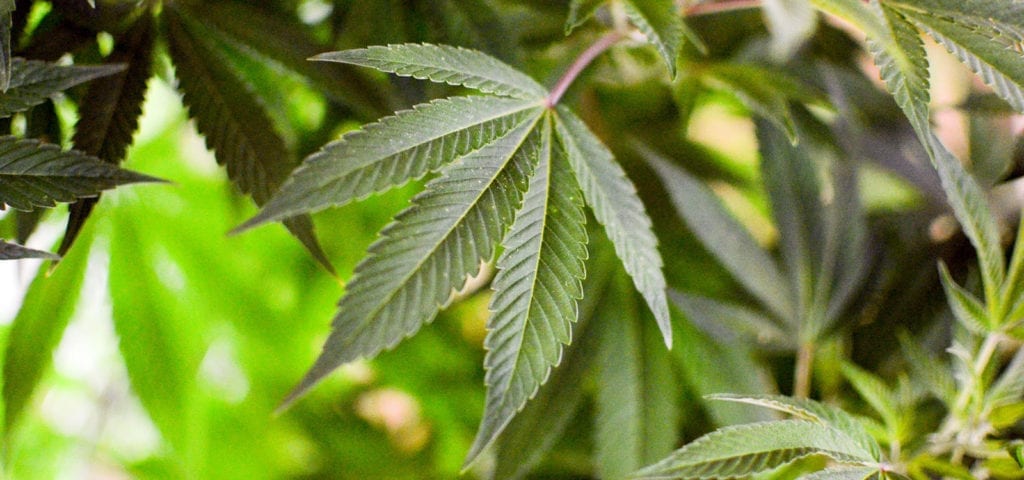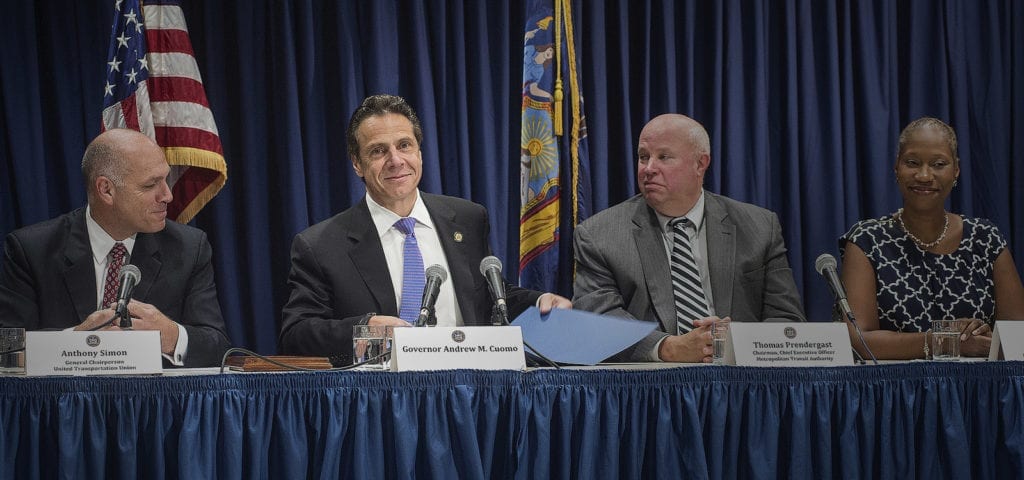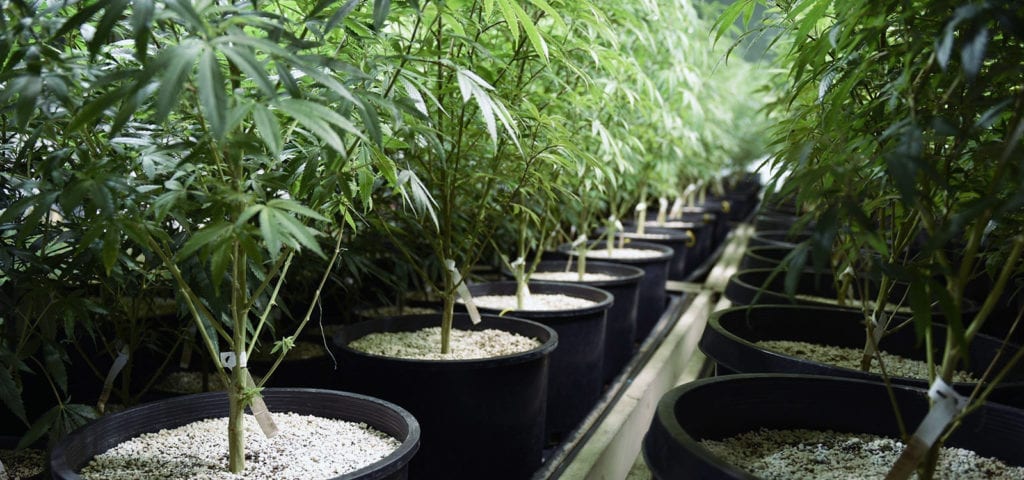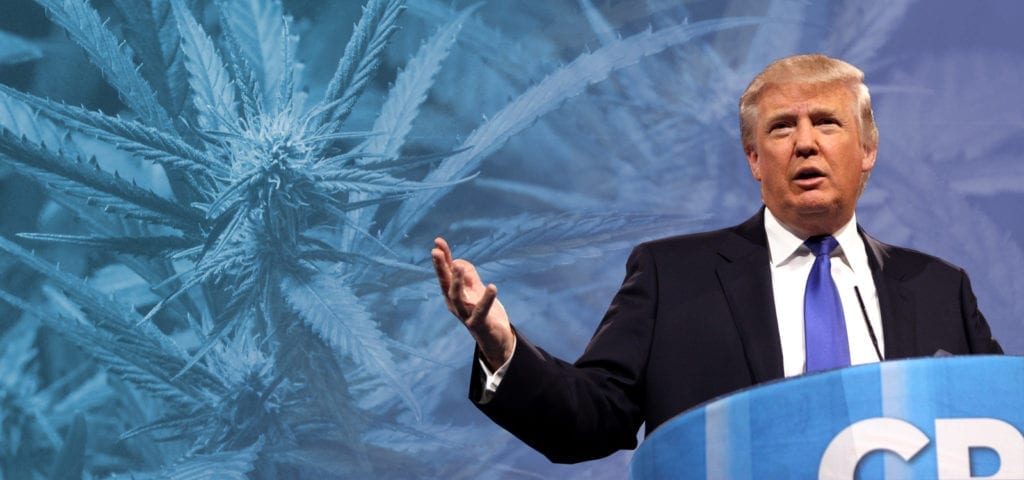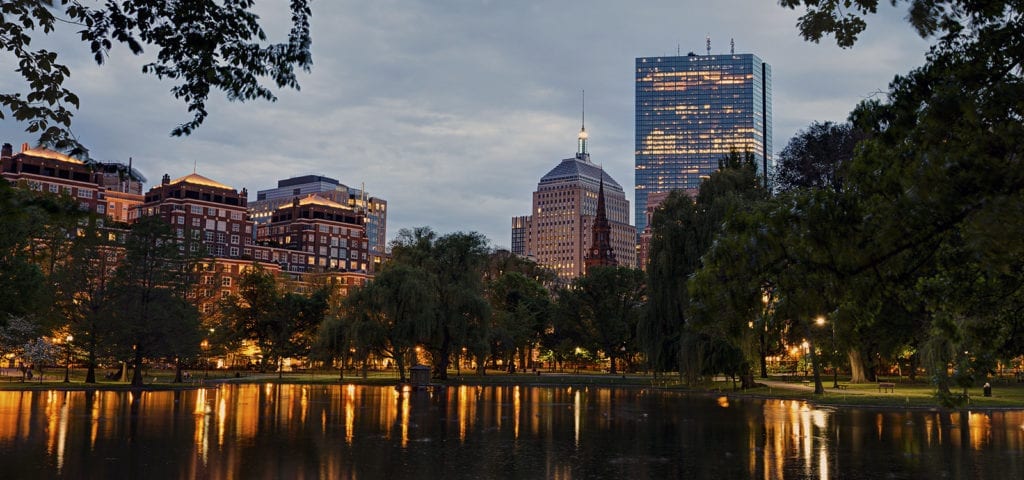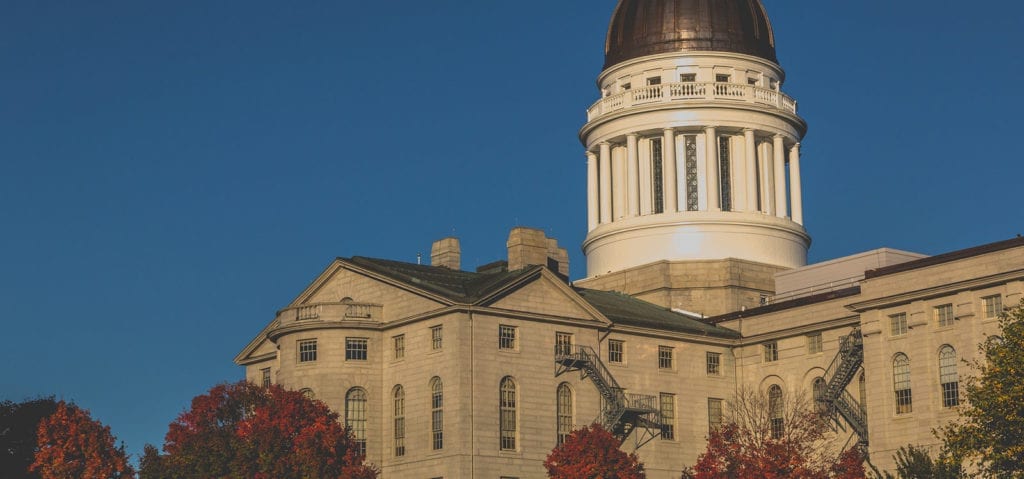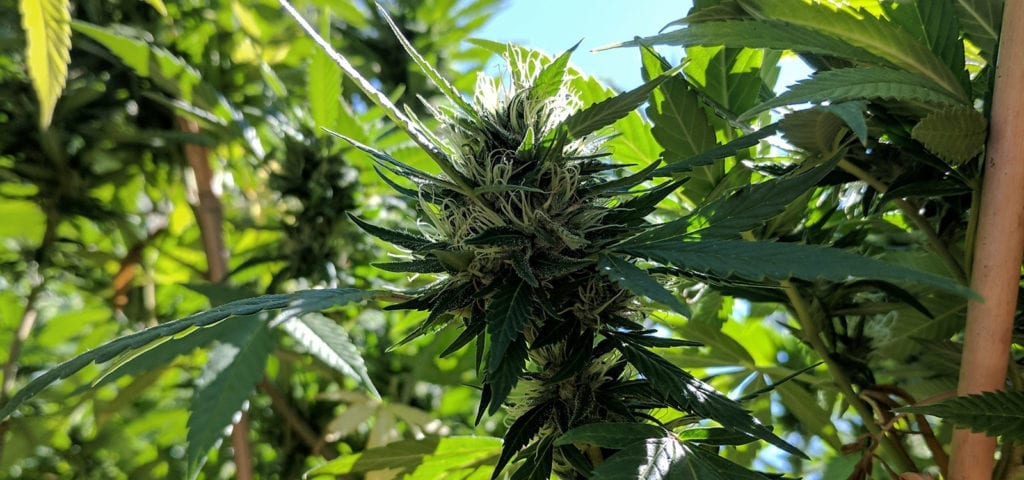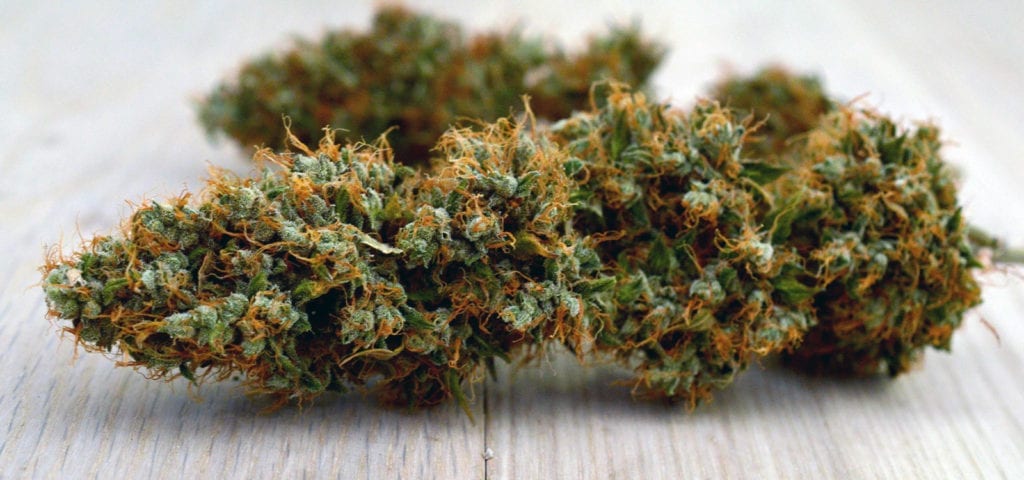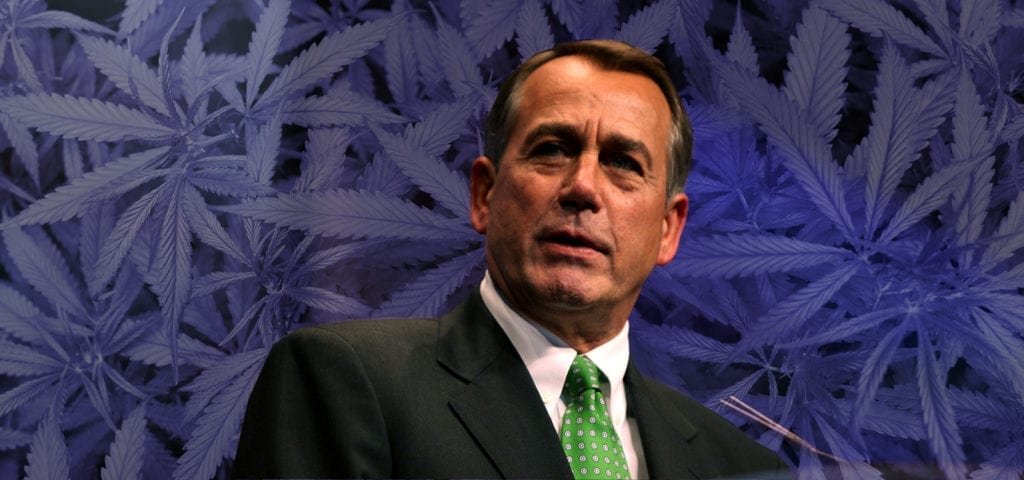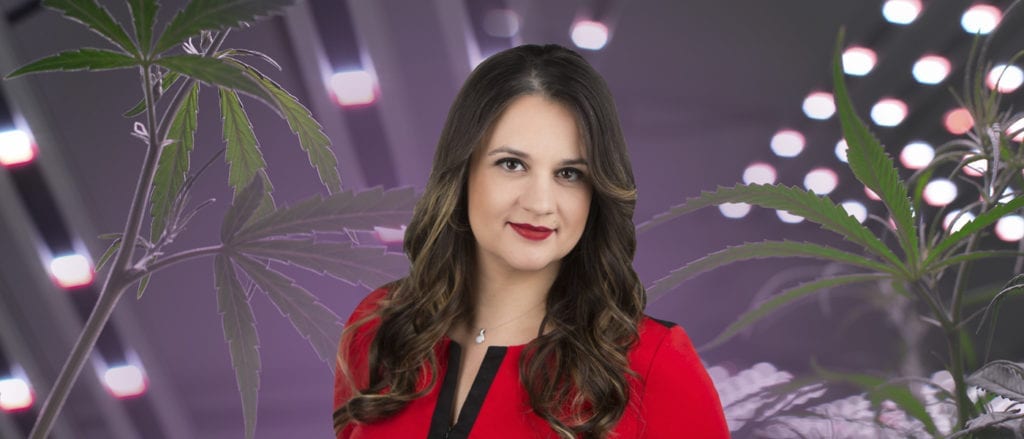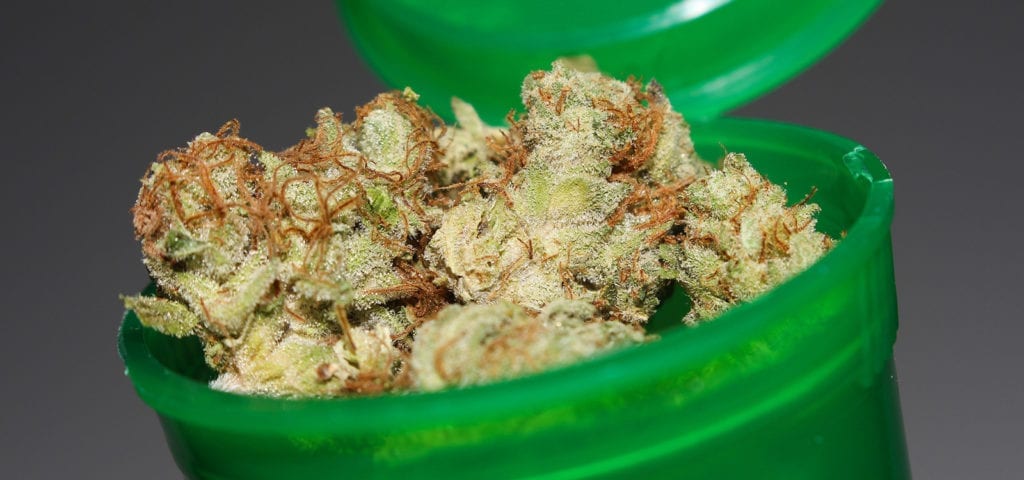Kristina “Kay” Garcia is the CEO of Women Grow, an international organization created in 2014 to be a catalyst for women to influence and succeed in the cannabis industry.
In this Ganjapreneur.com podcast interview, Kay joined our host TG Branfalt to discuss her role at Women Grow and to weigh in on the state of the cannabis industry. Kay shares what she brought to Women Grow when she joined the team in 2015, including lessons she learned from a wide spread of professional experience that ranges from the corporate atmospheres of New York and London to humble farm work, raising cattle and chickens. She also discusses the organization’s growth and accomplishments since she took the helm, offers insight into the industry’s future and the difficulties ahead, and much, much more!
You can tune into the interview via the player below, or scroll down to read a full transcript of this week’s Ganjapreneur.com podcast episode.
Listen to the interview:
Read the transcript:
TG Branfalt: Hey there, I’m your host TG Branfalt and you are listening to the Ganjapreneur.com podcast, where we try to bring you actionable information and normalize cannabis through the stories of ganjapreneurs, activists and industry stakeholders. Today I’m joined by Kay Garcia, she’s the CEO of Women Grow, an organization which aims to connect, educate, empower and inspire female cannabusiness owners in an expanding industry. How you doing this afternoon Kay?
Kay Garcia: Really well, thank you.
TG Branfalt: I’m really happy to have you on the show. We’ve been trying to book this for a while. The summit was in the way, and we’ll get into all that, but before we do, I wanna talk about you. What’s your background? How’d you end up in the cannabis space?
Kay Garcia: It’s a strange story. I guess it’s not that strange, but I’ve kinda been all over the place. I went to Rutgers University to be a veterinarian, decided that wasn’t gonna be a … I couldn’t commit to the money, I couldn’t commit to the amount of schooling and then I was like “Oh, let’s try environmental law instead.” And that was also not where I ended up. I started working for Apple Computer, and this was right before they started the retail arm of their business and so I joined Apple, I was the photo girl, I helped them set up a lot of the new stores on the east coast, became really involved in logistics and operations and stayed with Apple for about, I think it was about eight years.
Then I moved to New York City, and that is actually where I met Jazmin Hupp, one of the co-founders of Women Grow, she hired me to work with her technology retailer in Manhattan and I was creating websites and eCommerce channels and working in customer support and setting up new different streams of revenue for that company and while I was living in Manhattan, I got really, really involved in the startup scene.
It was super attractive, hack-a-thons, all that kind of stuff, and I started working for a startup called Movie Pass, worked there for about a year and I think that … I had experiences at Apple and throughout my career, but it was really at Movie Pass where I learned a lot about culture and how the culture of a company and the tone that you set as a founder really can impact the experience of your employees and everything else that you touch. Movie Pass was not a really positive environment, and we were in the Aol Ventures office and me being one of literally maybe three or four women in the entire office was challenging, but it was watching certain behaviors be accepted and sometimes encouraged that was really upsetting, and I left Movie Pass after about a year to go work on a cattle farm raising cows and chickens and sheep and did that for a while, then came back to the corporate life to work for SAWater companies in project management and IT and ran their North American retail operations for a while.
Had a little bit of a nervous breakdown, couldn’t deal with a lot of the politics and craziness and moved to London, a sight unseen, I’d never been before and was like “This just sounds like a good idea, I can speak the language at least, so let’s do that.” And ended up across the pond and SAWater asked me if I would stay on as a consultant out of the London office and I was like “Sure, I need the cash.” Stayed there as long as border patrol would let me and then I had to come back to the states and that’s where I ran into Jazmin again and she’s like “Hey, I’m really doing something interesting, it’s weed and women.”
And I was like “Okay, I have experience with one of those things.” And I joined Women Grow, and it was June of 2015. I was the director of operations, focusing on looking at what was going on here and getting involved and setting up some infrastructure and logistics and realizing that “Hey, maybe I should try some weed at this point in time.”
Then he was just my boyfriend, who’s now my husband, but Ronnie, he obtained some very stinky stuff and I was like “This is gross.” And I had my first joint in July of 2015 and it was a very amusing experience where it was like “Is this high? Is this what people are talking about? Is this a real experience?” And he’s “Yes.” And I was like “Oh, I get it now.” And that’s how I came to Women Grow.
TG Branfalt: That’s a really, really interesting path. We get a lot of people who are from real estate and that sort of thing, but to come from SAWater or Apple, that’s a really incredible sort of story. Describe what Women Grow does and the mission of the organization.
Kay Garcia: Women Grow was founded in 2014 by Jane West and Jazmin Hupp and the mission of Women Grow is to educate, empower, connect and inspire the next generation of cannabis leaders. That’s our official tagline. I think the involvement of women in a brand new and burgeoning industry is really critical. You’ve got all sorts of other industries where women are a part of them for sure, but not to the degree with which they are currently and which they should be in the future involved in the cannabis space. I think Women Grow, we’re really young still, we’re about four years old, but we’re trying really hard to serve a couple different audiences. We wanna be the safe space for people that are interested in learning about the plant and about the industry that revolves around it.
We also want to provide resources to people that are in the space already who are looking to grow their businesses or take on new challenges. I envision a circle, right? So you’ve got newbies entering the space that have never operated a business before and they’re learning and they’re becoming more educated, they’re forming these new connections and then they sort of graduate, right? And they have this business of their own and they’ve got all of these grand ideas and then now they are taking that experience and they’re educating the people that are coming behind them, and Women Grow is kind of that space for those people to interact with each other, and we have our signature networking events that are on the first Thursday of every month. We operate throughout the US and in Toronto, Canada right now.
And people go to these events, they get to connect with people that have similar ideas and also totally different ideas, which is great, then they get to partake in a little bit of education, usually we have a speaker or some panelists that talk and then we wrap that up with a little bit more networking and we have infinite stories that we have to do a better job of collecting and distributing about how, “Oh, I met my partner at a Women Grow meeting. Oh, I hired three people at this event. Oh, I came up with this brilliant idea and now I found my accountant and my attorney at a Women Grow meeting.” We really seek to be that space for everyone to kinda come and connect.
TG Branfalt: It sounds like so far you guys are experiencing successes you may not have anticipated with people meeting their partners there and things like that. That’s super cool. I know that you can’t really speak to how the organization has changed since it’s inception in 2014, but can you sorta describe to me what changes you have noticed within the organization and even within the cannabis industry in your experience since you joined Women Grow in 2015?
Kay Garcia: Absolutely. I that when I came, we had … We were somewhere right around high 20s, low 30s as far as our reach, Women Grow into different cities, and we kinda blew up in 2015. I personally was helping to lead the charge of opening more markets, thinking that that was the best thing to do. So by the end of 2015, we were operating in about 45 different cities simultaneously, which was fantastic. And it sounds great right? And then you’re like “Hang on a second though, we don’t have a plan for growth, we don’t have a plan for any type of structure, what’s the longevity here? You just keep adding more people into this pipeline but what kind of value are we actually providing them?” So then 2016 was really an opportunity to take stock at what our core mission was and to go back to that.
We have a membership program now that we didn’t have in the beginning, I think we have less markets operating at a given time right now, but they’re more stable and they’re consistent. I think it’s a lot more valuable to have a market leader. I look at our New York market ’cause that’s pretty close to me, and Tanya’s hosting an event, not only signature networking events every month, but then she holds extra events and high teas and she does some stuff with merchandise, and so there’s more value to the community around her because she’s more present in it and back when we had 45 markets, it sounded great on paper, but we weren’t having events consistently in each of those markets, so I know that’s something that we’ve definitely changed and I think there’s always a lot of talk about diversity and inclusion across all industries, but I think in the cannabis space, it’s especially important just given the war on drugs and disenfranchisement of black and brown people and now you’ve got a lot of times rich white men and women that are being lauded for their efforts in the cannabis space, meanwhile that path was trailblazed by somebody else who might be sitting in the jail cell right now for having a dime bag on them.
I think as an organization, we’ve really focused on looking at the markets and making sure that we have representation from all different communities in our markets. We have had issues in the past where there might be a market that’s in a community that has mostly black and brown people and it’s only ever white women at this event and that doesn’t really represent the community well and I don’t think that represents our mission well if we’re not speaking to the entire community and who is most present in it.
But I think at our leadership summit, just this past, I guess a couple weeks ago now, walking into the room and seeing a multitude of faces that some people are clearly … That we’ve had Asian people, we had black people, we had brown people, we have white people and everybody was together and everybody was focused on connecting with each other and focusing on this mission instead of focusing on just the color of someone’s skin.
TG Branfalt: With your diverse background in industry and now you’re obviously recognizing some of the issues that are in the cannabis industry, which you’ve really processed a lot in a few short years. Was there any sort of trepidation for you entering a space that carries this stigma?
Kay Garcia: At my core I’m a problem solver, and that’s basically all I ever want to do is solve problems, and within this space, there are a lot of problems that need to be solved. But the organization is new, obviously, this is my first time as a CEO and everybody’s gotta have it sometime, right? But I’ve been leaning on the people that support me and support our mission and so Gia Morón who she came to Women Grow in January of 2017, she came onboard to do a lot of media relations.
I made her director of communications officially as an employee last year and then at our summit, we announced her as an executive vice president role, but Gia doesn’t look like me and Gia doesn’t have the same background as me so she has different perspectives on things and I really value that and I’ve talked to her. It’s funny ’cause her and my husband, they talk about I’m their wife of both of them, right? I’d be laying in bed, it’s like 10 o’clock at night and I’m talking to Gia on the phone and Ronnie’s just like “Okay.”
But it’s that sharing of ideas and listening to someone else’s perspective on things and kind of opening your mind. I’m a big fan of saying strong opinions loosely held. I will feel very strongly about something, but I also need to listen just as strongly because maybe I’m not thinking about something and I think in the cannabis space, it’s touchy, right? It’s race relations, and that’s a very, very difficult topic and what I really value about Gia’s perspective is as a black Latina, she has opened my eyes to a lot of things that I just didn’t even know existed. And they could be as silly as I didn’t know that there was a black people birthday song, that I love it, and she told me about it and it’s a riot, but then there’s also things like “Hey Gia, how can we make a difference?” It’s more than just about signature networking meetings, and it’s making sure that we have our presentation in our markets and Gia was a huge force in that in helping me understand what kind of qualities we need to look for and she’s really been a mentor for me throughout this whole process.
TG Branfalt: I wanna talk to you, you’d mentioned leadership summit, I wanna talk to you more about that. Before we do that, we gotta take a break, this is the Ganjapreneur.com podcast, I’m TG Branfalt.
If you are looking for a job in the rapidly growing and highly competitive cannabis industry, Ganjapreneur.com is the place to look. Visit the Ganjapreneur job board today to browse current openings with cannabis openings throughout the United States. From entry level bud tender positions, to executive level career opportunities, you can also create a profile and upload your resume to be discovered by cannabis recruiters. Visit our job board at jobs.Ganjaprenuer.com to create your profile today.
If you are a business owner, you can post our job openings for as little as $25 on our job board to reach the largest and most engaged audience of cannabis professionals on the web. Companies who are listed in the Ganjapreneur business directory are eligible for free job listings. If you’re already signed up, contact us today via the website or send us an email at grow@Ganjapreneur.com to activate your unique coupon.
TG Branfalt: Hey there, welcome back to the Ganjapreneur.com podcast, I’m your host TG Branfalt here with Kay Garcia, CEO of Women Grow, totally fabulous. You said earlier you were talking about your leadership summit happened a couple of weeks ago. Describe to me what happens at that event, how was the interest compared to some of your previous summits and was there concern about federal policy changes by the attendees? Sort of give me the rundown on the feeling of this summit.
Kay Garcia: Yeah, even just leading into summit, there was a lot of back and forth going on, it’s like “Oh, what’s Session’s gonna do.” And “Oh, the Cole Memo.” And all of these different policy changes, and I think in the end, people definitely got a little scared. We had some people that were on the fence about sponsoring because they weren’t sure if they wanted to put their names out there and make a … Not that they didn’t have a target on their back already, but make it bigger. But I think in the end, a summit is a unique experience unlike any of the other cannabis conferences out there. Cannabis aside, I’ve been to a lot of different types of conferences, and it’s very different, and so the format that we typically follow is people start coming in on Wednesday, we do some special extra content for our market leaders so that they get to thinking we basically never see each other face to face.
This is the one time a year that not only does Women Grow headquarters, or the few employees that we have get to see each other, but this is the only time that the market leaders actually get together in a room at one time, and so this year we did some stuff on cannabis and sexuality, which was really exciting, got really great feedback about that and then Wednesday night, we typically have a party for our speakers and our sponsors and everybody just kind of get together and Thursday, we kick off the lightning talks, and these are consistently amazing. Think about Ted Talks, that kind of style, and you’ve got women up on stage, and men this year, sharing stories of success, of failure and how to get through both of those equally, and there’s always tears in the audience, every single year, and it’s really great stories.
Michelle Dumay was telling her story about her child and of course waterworks everywhere and people were just like “This is amazing.” And “Her kid’s alive thanks to cannabis.” And she’s a divorced Muslim woman, and she’s talking about her experience just in life, not even just in cannabis and yeah, so that’s Thursday, and then Friday, we have panels and workshops, and this year we added something called experiences, so people can get a little more hands on, we had a joint rolling class with Jane West.
TG Branfalt: Oh, cool.
Kay Garcia: Yeah. Willy’s reserve came and they debuted Annie Nelson’s new line of chocolate, and so we had a massive line for some hot chocolate there and also, what we do a little differently with our sponsors too, and we want people … We don’t want it to just be walk past a sponsor and forget about that, we wanna show our sponsors that we care about them, so we just put them right in the middle of everything and one of our sponsors is a CBD spa type of experience. She set that up in one of the presidential suites.
TG Branfalt: Cool.
Kay Garcia: And she had massages and foot baths and creams and all sorts of goodies both infused and not available for people to take part in, but its focused on health, it’s focused on wellness, it’s, again, going back to that mission of connection and making sure that people are connecting with each other and sharing their experiences.
TG Branfalt: And during that summit, you guys announced a Women Grow TV channel on Twitch. This is something I’ve noticed. There’s Burn TV, there’s a lot of these companies that are using the internet such as Twitch, to launch these media platforms. Tell me, what’s gonna be on the channel? What’s already on the channel and what other content might you guys be considering as it matures?
Kay Garcia: All of it. We have had a bit of difficulty being … We’re a networking organization, but everybody that’s not in the cannabis space only focuses on the cannabis part of our business, we have a leaf in our logo, so we’ve had difficulty with a lot of other platforms either taking our content off or not letting us have access to our content and so we were talking about where are we gonna have a home for all of our previous summit talks and other things that we wanted to start posting, we’ve been doing some educational webinars on investment with some of our cornerstone partners and it’s like where are we gonna kind of have all this stuff live? And my husband, he’s into video games and just started thinking about Twitch and how they’ve been kind of entering into stuff outside of video games and we could be right up there with Julia Child and Bob Ross, why not?
And so we developed a partnership with Loot Interactive and Tim Sabience of, some people might know him of Howard Stern fame, and we’ve been working on putting more content up there and focusing on really getting a lot of either our signature networking events or I’m actually … Right now I’m in the process of uploading some of our lightning talks from this year’s summit onto our channel. But we’re really looking to do a lot of different things and if you’re, and it doesn’t have to be focused only on women, it can be men too, but we wanna make sure that our members and people that have always been supportive of Women Grow, that they’re getting some light shined on them as well, and so we’re gonna be starting to do member interviews, talking about different regional updates.
I live in New Jersey, there’s a lot going on, and I’m sure people wanna know what that is, so making sure that we can give maybe weekly updates across all the different regions that Women grow represents and let people know what’s happening. Talk about different products there that are available, really anything. I know that the loot guys, they were like “Oh, there’s the cannabutter guys that are on Twitch too.” And we can get them and I was like “Yeah, but it’s a whole bunch of dudes.”
So I wanna give my channel to … If there’s supportive men out there, sure, why not? Let’s get some ladies up and put the camera on them and let them shine.
TG Branfalt: So you’re telling me that just because you talk about cannabis and have a leaf in your logo, you have been denied the ability to push content on certain mediums?
Kay Garcia: Yeah, we were told it’s cannabis focused and I was like “It’s education.” We’re talking about molecules and things like that. First of all, not that many people are interested in that kind of depth, but the people that are, we’re not saying “Hey, go to this street corner at two o’clock and I’ll sell you a blunt.” We’re talking about, “This is how you write a business plan.” And because of … We’ve had trouble, I had to fight to get a bank account. Yeah, and finally I walked into a bank, a bank that was having some PR troubles of their own and I was like “Listen, you need a women owned business on your roster.” And they were like “Okay, you’re right.” It was like “Okay, cool.” But that was after walking into six other branches across New Jersey and nobody wants to even give us a time of day. And it’s silly. It’s a problem.
TG Branfalt: Was that something that you were expecting? Coming from the non-cannabis industry? Were you thinking “Oh, this is just sort of a networking organization.” Were you prepared to be turned down by platforms and banks?
Kay Garcia: No, not at all. Coming from tech and having to raise money as a women, that was bad enough. That’s super challenging for a lot of reasons, and I was expecting that fight. I was not expecting that because I had a leaf in my logo that I was gonna have to come up with all sorts of creative arguments, and essentially, Tim, I literally just had to go through a special corporate review process for life insurance because as an employee of Women Grow, it’s a cannabis company. And I’m like “Wait a second, you mean that because I work out of my home doing office and clerical work, I’m subject to a special review process?” It’s that kind of stuff that people don’t necessarily think about but it still happens.
TG Branfalt: That’s absolutely unbelievable.
Kay Garcia: Yeah.
TG Branfalt: I’ve never heard that in my life about the insurance, and I mean, I work from home and I write about cannabis, but no one’s giving me life insurance anyway.
Kay Garcia: Well, and that’s a thing, right? People will talk about “I’m gonna get in the cannabis business.” Do you really know what that means? Because it’s things like this that you don’t necessarily think about, and so maybe that’s an opportunity, right? I’m an ancillary business. Or I want to get into this space, what can I do? I’m an insurance broker, what do people care about that?
Well, people care about that quite a lot. If you can be in charge of underwriting policies for people that are in roles like I am, I’m literally sitting in an office at home typing on a computer all day, what’s so terrible about that? It’s the same thing that the company across the street does but it doesn’t matter, it’s because I have a leaf in the logo, and now people look at me with extra scrutiny and at times I’m warranted. The industry has a need for help with that kind of stuff, life insurance, business insurance. Business insurance is incredibly difficult and when you do that, it’s often super expensive because people associate added risk with what you’re doing. Meanwhile, if I was throwing parties with wine and beer flowing, people wouldn’t look at that with a second glance.
TG Branfalt: I’m really happy you shared that because that’s not an issue that I don’t think a lot of people recognize. Something just as simple as life insurance. I wanna talk to you more about some of the issues concerning females in the cannabis space and the representation there. Before we do that, we gotta take a break, this is Ganjapreneur.com podcast, I’m TG Branfalt.
At Ganjapreneur, we have heard from dozens of cannabis business owners who have encountered the issue of cannabias, which is when a mainstream business, whether a landlord, bank, or some other provider of vital business services refuses to do business with them simply because of their association with cannabis. We have even heard stories of businesses being unable to provide health and life insurance for their employees because the insurance providers were too afraid to work with them. We believe that this fear is totally unreasonable and that cannabis business owners deserve access to the same services and resources that other businesses are afforded. That they should be able to hire consultation to help them follow the letter of the law in their business endeavors, and that they should be able to provide employee benefits without needing to compromise on the quality of coverage they can offer.
This is why we created the Ganjapreneur.com business service directory. A resource for cannabis professionals to find and connect with service providers who are cannabis friendly and who are actively seeking cannabis industry clients. If you are considering hiring a business consultant, lawyer, accountant, web designer, or nay other ancillary service for your business, go to Ganjaperneur.com/businesses to browse hundreds of agencies, firms, and organizations who support cannabis legalization and who want to help you grow your business.
With so many options to choose from in each service category, you will be able to browse company profiles and do research on multiple companies in advance, so you can find the provider who is the best fit for your particular need. Our business service directory is intended to be a useful and well maintained resource, which is why we individually vet each listing that is submitted. If you are a business service provider who wants to work with cannabis clients, you maybe a good fit for our service directory. Go to Ganjapreneur.com/businesses to create your profile and start connecting with cannabis entrepreneurs today.
TG Branfalt: Welcome back to the Ganjapreneur.com podcast, I’m your host TG Branfalt here with Kay Garcia, CEO of Women Grow. The first thing I wanted to really discuss in this last part is the rate of female executives in the cannabis space is about 27% according to a 2017 Marijuana Business Daily report. The rate of women in executive positions in US businesses as a whole is about 23%. It’s not an insignificant difference, but it is, it’s an almost 5% difference there. What do you attribute that to as somebody who is a woman who works in the industry who talks to these women all the time?
Kay Garcia: Mm-hmm (affirmative), yeah. The numbers, they’re good, they could be better, if you look at the trend from 2015, and you could argue on some of the data collection on 2015 numbers, but overall, the rate of women is actually declining as opposed to increasing. I think women are a little tricky, right? Women look at potential investments differently than men do, they look at business plans and take risks differently than men do. I think men tend to be more hesitant, and that’s primarily because they’re looking at all of the different options. Let’s see, here’s all the things I need … Here’s 50 things that can go wrong, here’s two things that can go right.
But I think that’s a good attitude to have and I would like more women to get involved so that we can have better practices overall in the industry and all that, but when you look at the space as a whole, you’ve got skin creams and topicals, and that’s a really good way for women to get involved because that’s primarily a female product and women are using something, they probably know best how to make it or how to market it. When you look at cultivation and growing, I feel like that’s more predominantly male, although there are a lot of women that have been involved in growing since forever, but getting them to come out of, essentially, the closet and say “Come down out of Humboldt County and out of Mendecino and be part of this burgeoning industry.” That’s really challenging for lots of reasons.
But what’s happening in the cannabis space right now is you’re starting to see people with money that have not been in cannabis before get very curious and get very interested, and I know several women personally who have had fantastic businesses that they started and made extremely successful and then through a series of events, have either been bought out or pushed out of those same businesses by men with more money and that’s unfortunate, and I think that’s contributed to the decline of women in leadership roles.
I think it takes a lot of money to get started in cannabis and it is certainly not an easy job. It takes long nights, lots of sweat, and probably a lot of tears too. But it is something that we need more women in the space to make that a little bit easier for all of us.
TG Branfalt: What sectors are you seeing women in the cannabis industry most active? Is it that skin cream? Is it edibles?
Kay Garcia: Marketing, lots of marketing. You think of … Go back ten years, I mean go back two years, or go back even to last year, and you look at marketing for cannabis and it’s a lot of that “broy” type of stuff, I don’t know how to describe it, but it’s naked chicks with weed strategically placed on their bodies …
TG Branfalt: Rap albums.
Kay Garcia: Like graffiti fonts and stuff like that, and that’s not necessarily appealing to … Not even all men care for that too, let alone women. When I started working for Apple and I go back to that tech space, the approach that we took to retail stores was completely different. I remember when I was a little kid, going to a computer store with my mom to buy a Gateway 2000 and the guy looked at my mom like she didn’t know anything. She had done all her research, she knew more about the computer than he did, but she didn’t get that respect because she was a women talking about tech, and the changes that Apple retail made, that retail store design were really revolutionary and you can walk into dispensaries now.
I think the clinic in Colorado‘s a really good example. It has a very clean feel, you’ve got people behind the counter that know what they’re talking about and they’re very friendly and a lot of people that are walking to dispensaries are new to this whole space and they don’t know the difference between CBD and THC or how this topical is better for this type of pain and this strain is better for this type of headache or whatever.
So you’re dealing with a huge gap of knowledge and you need to have people that have that softer touch, and a lot of times that’s a woman. Whether she’s the one that’s providing that knowledge or educating the staff on how to provide that type of support, working on design of retail stores or product design, marketing to women who are huge consumers of cannabis, and there’s some studies that show that women’s consumption has skyrocketed compared to men’s and again, it’s not just smoking the plant, right? You could be vaping, you could be using it as a topical, you could be using a transdermal patch, there’s all different ways of consumption, and I think women being, as they always have been, the caretakers of the household, they’re making those choices not just for themselves, but also for the family, and so whether it’s an adult use situation or a medical use situation, women are getting involved and women need to be targeted and marketed to.
TG Branfalt: In which sectors are you seeing the most under representation of women?
Kay Garcia: Investment. And I think that’s not just cannabis, right? That’s across everything, but the VCs that have the funds, how many of them are women? Not many, but I think that’s changing. I just was at a conference up at Yale last week and I was on a panel with Gene Sullivan, Emily Paxia, and they’re both reputable in the cannabis space and they’re working hard to get more women businesses funded. I think you’ve also got within cultivation. I look at New Jersey and you go to any of the treatment centers here, or any of the grows that are in those treatment centers, you’re looking and you’re not seeing a lot of women necessarily in that trimming capacity or in the cultivation capacity. I think there’s a lot of women that have a green thumb and that they just need to be told that it’s okay to focus on this plant as opposed to growing some basil in your back yard.
But I think cultivation we can definitely see more women, I think we can definitely see more women in funding rounds and just overall, if you have an idea, just take the chance and go for it.
TG Branfalt: What advice do you have for entrepreneurs, be it male or female, looking to enter the space, you have a breath of experience in other industries, you have a very niche preview in the cannabis space, so what’s your advice for entrepreneurs?
Kay Garcia: Be prepared. People look at the cannabis space and they get googly eyed with how much money that they think they can get. It doesn’t happen over night and it does not come by easily. However you wanna get involved, I think the better way is to go through an ancillary route and come in as a marketer or an accountant or provide legal services, provide logistics support and fulfillment tracks and things that don’t necessarily touch the plant will be easier for you to get funding for, for investment, for just opening up a bank account, as I mentioned, and it’s easier for you to get involved that way.
If you do wanna get involved with touching the plant, that’s also an avenue for you, but be prepared to spend a lot of money. It takes a lot of money to make a lot of money and you can expect that investment to not provide you a return for a good couple of years minimum, probably a lot longer than that.
But I would say being prepared is key, and over the past few years, I’ve been out to Colorado and California and Arizona and Nevada and I’ve looked at all of these different states and every state has their own type of rules and regulations and then you go up to Canada where they truly treat cannabis as medicine and they have their own challenges up there, but I remember being, I think it was back in 2016, we had a bunch of Canadian folks come down and they were touring dispensaries in Colorado and granted, a lot’s changed since then, but back then, they were horrified at how people were allowed to touch the plant with their bare hand and people were like “Sniff this.” Or “Touch this.” Because for a lot of people, cannabis is medicine and you need to treat it that way and be very clean and organized and so we’ve seen regulations change drastically just in the past few years.
Now, if we, and I mean all of us, but especially women who tend to be a little bit less risk taking, if you can prepare yourself and prepare your business and instill practices today that reflect the most stringent regulations on the planet, not just in your state, but if you can take Canadian regulations or wherever they’re very strict, imagine what that will look like for you being successful two, three, five years down the line when more regulations coming down, whether it’s state or federal.
You’ll have already been operating that way. You’ll already be prepared and then so the other people that have to spend a lot of extra money and extra time and may go out of business because they didn’t have that preparedness, now you’re the only girl in the game and now you can get more money and you can have a more successful business, so be prepared like a boy scout.
TG Branfalt: Or a girl scout.
Kay Garcia: There you go.
TG Branfalt: Where can people find out more about Women Grow, the summit, the Twitch channel? Give us the run down.
Kay Garcia: Yeah. Sure, so WomenGrow.com is our website, you can find out how to, if you’re interested in starting a market, there’s an application there, if you’re interested in finding your local market, there’s a list of signature networking events so you can see when the next one is, but you’re actually, again, first Thursdays. So we’ll be coming out with one soon. You can also sign up for our newsletter, and that’s really the best way to keep in touch with all things Women Grow. We make all of our announcements through our newsletter, we also have our Twitter and Instagram handles, which are both @WomenGrow, but sign up for that newsletter, get involved, start making some connections, join our Facebook group, come to the next year’s leadership summit and come to, I guess in a couple weeks, the next signature networking event in your area.
TG Branfalt: Okay, this has been a really, really great conversation. I’m delighted that we’re able to find the time, especially after the summit, to touch base. Thank you so much for your insight. Really a pleasure to have you on the show.
Kay Garcia: Thanks Tim, it’s been a really great time.
TG Branfalt: You can find more episodes of the Ganjapreneur.com podcast in the podcast section of Ganjapreneur.com and in the Apple iTunes store. On the Ganjapreneur.com website, you will find the latest cannabis news and cannabis jobs updated daily along with transcripts of this podcast. You can also download the Ganjapreneur.com app in iTunes and Google Play. This episode was engineered by Trim Media House, I’ve been your host, TG Branfalt.
